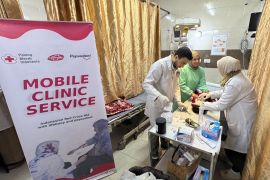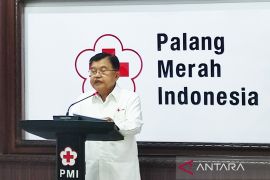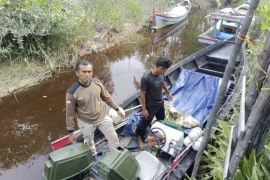Parts of southern Somalia are suffering from famine and tens of thousands of Somalis have already died in the worst hunger emergency in a generation.
Therefore PMI General Chairman Jusuf Kalla said here on Wednesday that the bank account to raise funds was a form of the Indonesian Red Cross` commitment to helping the people of Somalia.
"With great concern and care for the Somalis, we open the bank account as a form of our commitment to helping them," said the former Indonesian vice president.
Jusuf Kalla said a devastating drought and the worst food security crisis in Somalia had resulted in hundreds of thousands of people suffering from malnutrition and hunger.
The PMI chairman reiterated that the bank account was part of the Indonesian Red Cross` commitment to helping the Somalian people, in addition to facilitating Indonesian community who would like to help ease the suffering of Somalis.
Kalla said the funds, to be channeled later to Somali Red Crescent, were raised by PMI in cooperation with International Committee of the Red Cross (ICRC).
He added that Indonesian community who wanted to help with their money could transfer it through Bank Mandiri account number 070-00-0637957-9 on behalf of Indonesia-Somali Red Cross.
Meanwhile, Somalian Ambassador to Indonesia Mohamud Olow Barow visited Jusuf Kalla at PMI head office on Tuesday to ask for support and prayers of Indonesian society.
On behalf of the people and government of Somalia, Mohamud asked for various humanitarian assistance from the government and the people of Indonesia.
The Somali envoy at the meeting with Kalla said the assistance could be in the form of food, medicine, kids nutrition, tents, and other aids desperately needed by the Somalis.
According to Associated Press (AP), the Horn of Africa is suffering a devastating drought compounded by war, neglect and spiraling prices.
Meanwhile, aid group Oxfam said some areas in the region have not had such a low rainfall in 60 years.
AP quoted Mark Bowden, the U.N.`s top official in charge of humanitarian aid in Somalia as saying late in July this year that the United Nations needed US$300 in the next two months.
Bowden said the southern Somali regions of Bakool and Lower Shabelle regions are suffering from famine, while across Africa, more than 10 million people need aid.
"Somalia is facing its worst food security crisis in the last 20 years. This desperate situation requires urgent action to save lives," Bowden said.
He said due to poor harvests and infectious diseases, the famine would spread to all eight regions of southern Somalia within two months if nothing was done about it.
"We still do not have all the resources of food, clean water, shelter and health services to save the lives of hundreds of thousands of Somalia," he said.
Most of Somalia has been wracked by civil war since its last government collapsed in 1990. Islamist rebels currently hold most of southern Somalia. They banned most aid agencies from working there two years ago but rescinded the ban earlier in July.
Meanwhile the United States Secretary of State Hillary Rodham Clinton said recently that the U.S. government would give another $28 million, on top of the $431 million in assistance it has given to the Horn of Africa this year.
Britain has pledged $145 million -- about 15 percent of what was needed -- and the European Union pledged around $8 million, with more expected in the coming days.
Spain has promised nearly $10 million and Germany around $8.5 million but Oxfam said France has so far not pledged any more money and Denmark and Italy have said no significant new sums were available.
According to Los Angeles Times, the United Nations in July 2011 declared a famine in Somalia, and said child malnutrition must be 30 percent or higher, and daily deaths at four children per 10,000 people.
"For months, people have been trudging out of the desert, leaving their dead children behind and carrying those who have managed to survive, and the horror of hunger and death unfolding in the Horn of Africa officially got a name: famine," the UN said.
Meanwhile, UNICEF, the U.N. agency that focuses on children, said child malnutrition rates in southern Somalia had doubled in a single month - in some places to 55 percent - and infant deaths have increased to six per day.
It has been nearly a month since the United Nations declared a famine in Somalia and the situation continues to deteriorate, but according to to www.cbc.ca, an estimated 2.8 million Somalis are still at risk of dying from starvation.
Even worse enough, a cholera outbreak is now spreading across the country and the UN World Health Organization reported that 181 people have died from suspected cholera cases at a single hospital in Mogadishu, and there have been several other confirmed outbreaks elsewhere. (*)
Reporter: Otniel Tamindael
Editor: Otniel Tamindael
Copyright © ANTARA 2011











